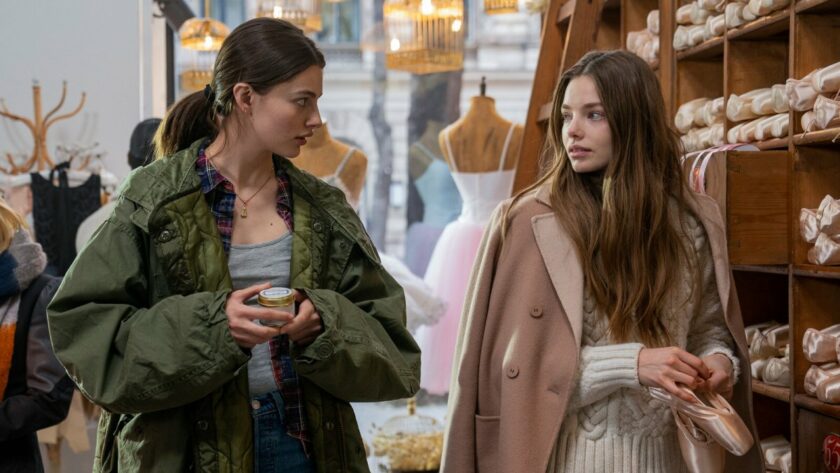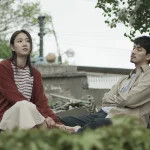‘Birds of Paradise’ is a modern sensual upper-class Survival of the fittest parabole to finding spiritual freedom and self-expression through dance.
Director Sarah Adina Smith got the blessing to adapt A.K. Small’s young-adult novel Bright Burning Stars through her own lenses, stating: “Maybe someday I would wanna’ do a more […] rigorous, faithful adaptation of a book. At this moment in my life, I’m still very much […] finding my own voice […] so when I’m doing an adaptation, I prefer […] to evolve it […] into my own story too.” The story is a coming-of-age piece on overcoming grief, hardships, and finding oneself through a techno-gothic international allure of high-end ballet.
The story is set in Paris, the heart of ballet dancing, and follows two American teenage girls, Kate Sanders ( Diana Silvers – Booksmart, MA) and Marine Elise Durand, or M for short, ( Kristine Froseth –‘Looking for Alaska, The Society) portray the tale Kate’s father used to tell her when she was younger: that of a bird looking to break free from an eternal night cast upon nature by poking holes in the sky. Birds of paradise uses this tale as an innuendo to encourage the ballerinas to pursue their dreams and search for their freedom, since those poked holes became the stars of the night sky and the bird was eventually set free through her courage.
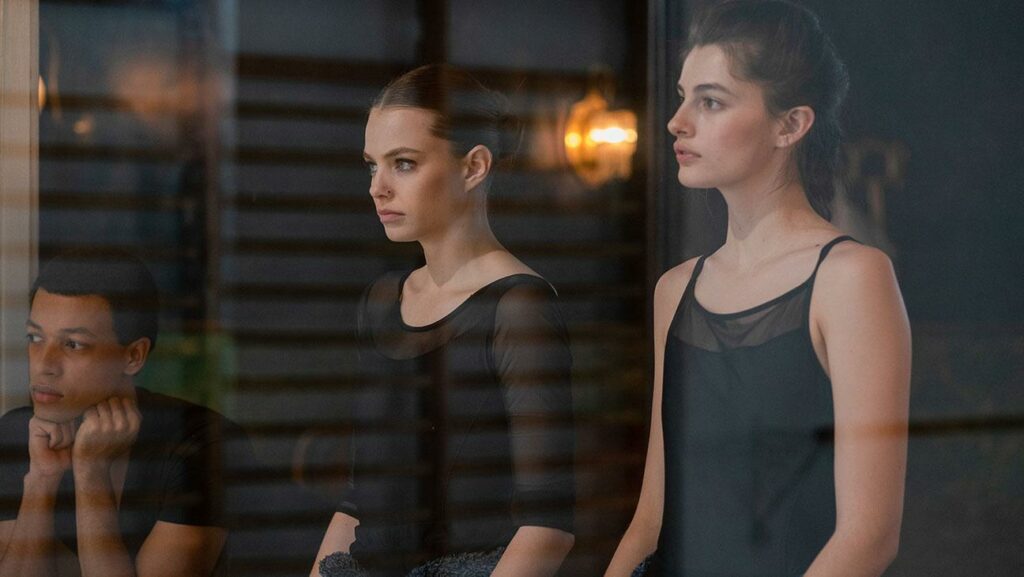
Visually the motif of the bird as a metaphor for freedom is used in the girls’ movement and clothing whenever they choreograph their own dance routines, practice together and showcase alternatives to traditional ballet, such as contemporary. The pair also loves to bend the rules by dancing at night in a rainforest concept club called Jungle where they dance freely by wearing plague-like beaked masks and rainbow glitter.
Marine wants to rebel against the exclusivist and over-demanding system she was a marionette to, as her brother Ollie called her, but she is too emotionally drained to do so since her twin’s suicidal passing. Having Kate as her new sidekick and secret dance partner, she focuses on discovering herself, understanding her desires, learning how to become a better half to someone else, and being less of a puppet to the controlling devils her parents and her teachers are. M hopes that she and Kate would be the first exception to the traditional boy-girl contract pairings of the Paris Opera.
Throughout the film, both main leads show impressive character development, although it takes a longer time for Kate to find her own freedom. Diana Silvers brings the introverted girl-next-door trope very well on the big screen, making it easy for the audience to sympathize with her, even when she turns cold and betrays mourning Marine, for Silver’s character remains an outcast even when she is in the top five ballerinas. Kate Sanders is by far the most intriguing and complex role Diana Silvers has ever taken on so far.
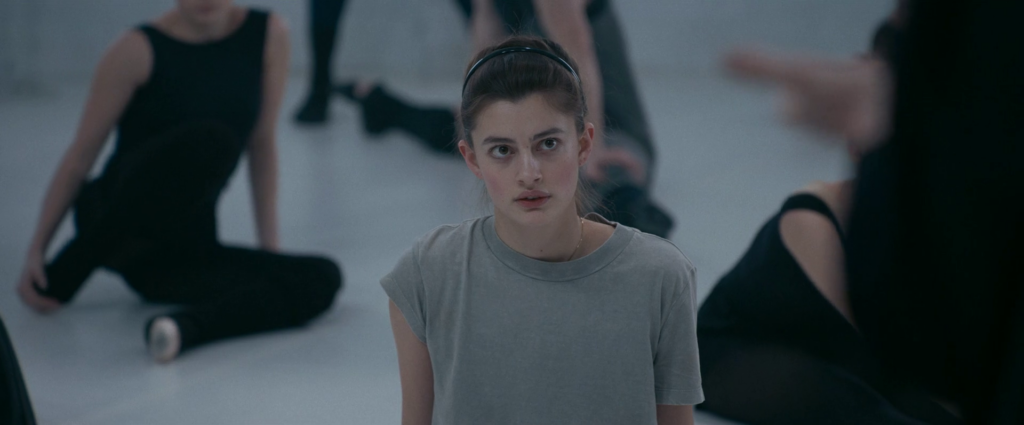
The duo moves from enemies to crushes to best friends very quickly thus being accused of queerbaiting. With all the pressure to be perfect in the ballet room, there is not enough time to explore that side of the main characters’ sensuality besides as a token of assertion of power. Since “what makes a perfect prima ballerina is total submission”, the magnetic duo consents in a threesome with the best dancer in school, Felipe ( Daniel Camargo), but that is merely to make the best male ballerina totally submissive to them, not actually knowing how the girls ever felt about each other or Felipe.
It is all a sensually confusing game of Survival of the fittest where no labels are involved and chemistry guides the characters’ interactions and final outcomes. Felipe even tells Kate in private practice, before hooking up, that: “Nobody pays to see perfection. They pay to see romance, desire, dominance, bodies touching bodies.” The characters never know what labels to put on their relationships because they rarely agree on terms. M wants someone to fill the void of her late brother “We’re best friends, We’re sisters”, while Kate just wants to win the contract of the Paris Opera: “You would have a threesome with your sister?”.
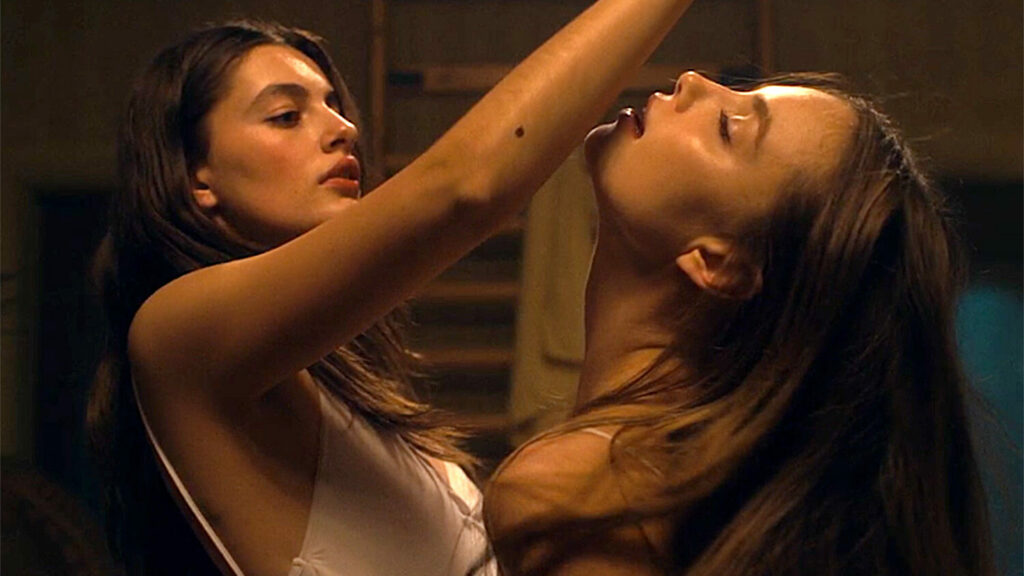
The pair is complementary considering their different backgrounds and what makes this dynamic work at first is trust and their similar reasons for dancing: trying to get closer to a late dancer family member. Kate Sanders comes from a modest family and is used to trusting people and tries to gain Marine’s trust which is exactly what she has been looking for since losing her brother. When Kate loses her trust in M, the duo crashes, and then Marine’s goal is to regain her partner’s trust.
Dance is an expression of feelings and sensuality. Marine’s last dance is a moving spectacle of the bird’s parabole, an ode to her late suicidal brother Ollie and a direct message of submission to Kate to prove that she remains faithful to their pact despite Kate explicitly canceling it in front of M. At that point, Kate’s only goal was to be better than Marine: “So who was it? Me or M? Please, I need to know…” not realizing she remains stuck in the same high-end ballet game M has been trying to escape from.
While the premise of the movie is far from revolutionary, one can easily get charmed by the magnetic leads, Silvers and Froseth, their electrifying chemistry, and the whole mysterious universe they create in search of self-expression. I believe some aspects if dealt with in more detail, like how does Marine know of the Jungle, or how often did the pair go there together would’ve made the movie an instant young-adult classic. That being said, I believe it is one of the best teen dramas in the past decade and it’s a definite ‘must-see’ for all coming-of-age movie fans.
Birds of Paradise is streaming on Amazon Prime now. Watch the trailer here:

